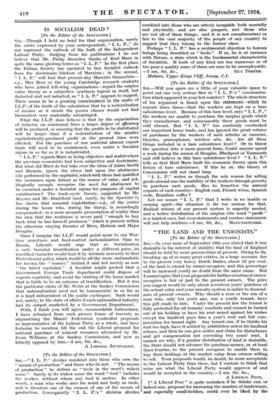IS SOCIALISM DEAD ?
[To the Editor of the SPECTATOR.] SIR,—Though I hold no brief for that organization, surely the views expressed by your correspondent, " I. L. P.," do not represent the outlook of the bulk of the Independent Labour Party. Judging from his publications I do not believe that Mr. Philip Snowden thinks of Karl Marx in quite the same glowing terms as "I. L. P." In the first place the Fabian Society has operated to free Socialist outlook from the doctrinaire blinkers of Marxism ; in the second, " L L. P." will find that present-day Marxists themselves- e.g., Max. Beer or the young Cambridge research students who have joined left-wing organizations—regard the surplus value theory as a subjective synthesis logical in itself, but deducted and not inducted; as " I. L. P." appears to suggest: There seems to be a growing consciousness in the ranks of I.L.P. of the truth of the calculation that by a redistribution of income as it stands the poorer classes would not find themselves very materially advantaged.
What the I.L.P. does believe is that by the organization of industry on communal lines a larger degree of efficiency will be produced, so ensuring that the profits to be distributed will be larger than if a redistribution of the smaller capitalistically-produced profit at the present time were effected. For the purchase of raw material abroad export trade will need to be maintained, even under a Socialist regime in so far as it is industrialist.
" I. L. P." regards Marx as being objective and realistwhere the previous economists had been subjective and doctrinaire. But what did Marx do but take over the ideas of Adam Smith and Ricardo, ignore the stress laid upon the abstinence role performed by the capitalist,which with them had qualified the insistence upon labour as the source of value, and yet, illogically enough, recognize the need for abstinence to 'be exercised under a Socialist regime for purposes of capital construction ? The trade-cycle theory, supported by Mr. Keynes and Mr. Brailsford (and, surely, by the Spectator ?), has shown that seasonal exploitation—e.g., of the rentier during the boom who, during the slump, is accordingly compensated—is a more accurate presentation of reality than the idea that the workman is never paid " enough to buy back what he has himself produced," which is present within the otherwise varying theories of Marx, Hobson and Major Douglas.
Since I imagine the I.L.P. would point more to our War- time munitions and food-control nationalization than to Russia, Liberals would urge that as Socialization is only Socialist trustification under a different guise, its trustified character would lead it by intrinsic necessity to that Protectionist policy which would be all the more nationalistic for having the " masses " behind it and not merely as now " the hated capitalist." A Socialist might protest that a Government Foreign Trade department could dispose of exports equitably, and avoid the stinting of the home market that is liable to be an outcome of trustification. But it was the particular claim of Mr. Webb at the Sankey Commission that nationalization need not be bureaucratic in so far as it is kept independent of the public exchequer. Such would not, surely, be the state of affairs if each nationalized industry had its output marketed by a Government Department.
With, I think you will agree, commendable forbearance, I have refrained from such grosser forms of travesty as stigmatizing the Miners' Federation syndicalist proposals as representative of the Labour Party as a whole, and have forborne to mention till the end the Liberal proposal for national purchase of mineral resources advocated by Mr. Evan Williams at the Sankey- Commission, and now so bitterly opposed by him.—I am, Sir, tte., A LIBERAL JOURNALIST.






































 Previous page
Previous page